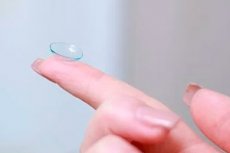New publications
Sleep and contact lenses are an unfortunate combination
Last reviewed: 02.07.2025

All iLive content is medically reviewed or fact checked to ensure as much factual accuracy as possible.
We have strict sourcing guidelines and only link to reputable media sites, academic research institutions and, whenever possible, medically peer reviewed studies. Note that the numbers in parentheses ([1], [2], etc.) are clickable links to these studies.
If you feel that any of our content is inaccurate, out-of-date, or otherwise questionable, please select it and press Ctrl + Enter.

Coming home late or feeling tired is no reason to sleep with your contact lenses on. Such negligence can have serious consequences for your vision.
A person who puts on contact lenses for the first time is very careful about wearing them at first. However, as practice shows, after a certain period of time, addiction develops, people relax and stop following some doctor's recommendations. As statistics show, about 30% of contact lens users periodically allow themselves not to take them off before going to bed.
The American Center for Disease Control and Prevention presented the following information: patients who ignore the rules and sleep with corrective means more than five nights a week often suffer from infectious eye lesions.
“Sleeping with lenses clearly increases the risk of infectious diseases of the cornea, which, unfortunately, is often found among adolescent and middle-aged patients,” say representatives of the Center.
In particular, the discussion is about the development of microbial keratitis - an infectious pathology that requires antibiotic therapy. Without treatment with powerful drugs, extremely unfavorable complications may occur.
Experts cited examples of individual cases from practice, when the presence of lenses during sleep over time led to dangerous damage to the cornea, the need for surgical intervention and even to the loss of visual function.
Thus, one of the patients was a 34-year-old man. He regularly went to bed without removing the devices and even swam with them in the pool, which led to the accumulation of dangerous pathogenic flora in the cornea. After some time, he had to go to the doctor, as he was bothered by a strange clouding in the eye on the left side. The doctor had to treat the mixed inflammatory microbial-fungal process for a long time, but even powerful treatment did not bring results. As it turned out, it was an acanthamoeba form of keratitis caused by a rare infectious agent - amoeba. As a result, the man's vision returned, but not completely.
Another case involved a 17-year-old girl who rarely removed her soft lenses and was eventually diagnosed with pseudomonas keratitis. The infection was cured, but it left irreversible scarring and her vision was noticeably worse.
The third patient, a 59-year-old man, decided to go hunting for a few days. It took only two days of continuous wearing of the products for an infectious perforated corneal ulcer to develop. As a result, it was necessary to undergo a serious and expensive corneal transplant operation, followed by a long period of recovery.
Perhaps, we are not talking about the most typical cases. However, no one can guarantee that after incorrect wearing of lenses some infectious process will not begin. Doctors warn: sleep and lenses are incompatible concepts.
Information is available on the website www.fda.gov
